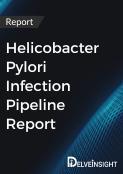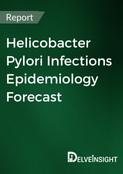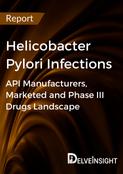Helicobacter Pylori Infection Pipeline
DelveInsight’s, “Helicobacter Pylori Infection - Pipeline Insight, 2026” report provides comprehensive insights about 5+ companies and 5+ pipeline drugs in Helicobacter Pylori Infection pipeline landscape. It covers the pipeline drug profiles, including clinical and nonclinical stage products. It also covers the therapeutics assessment by product type, stage, route of administration, and molecule type. It further highlights the inactive pipeline products in this space.
Geography Covered
- Global coverage
Helicobacter Pylori Infections: Understanding
Helicobacter Pylori Infections: Overview
Helicobacter Pylori is a gram-negative, microaerophilic bacterium that can infect humans. It is often found in the stomach of affected individuals and causes inflammation and ulceration. Patients harboring the bacteria are asymptomatic with abdominal pain, nausea, vomiting, and dyspepsia developing only after gastritis and peptic ulcer disease have set in however, these complications are less often seen in children and adolescents compared to adults. H. pylori infection is usually acquired in early childhood and persists in the absence of treatment. Transmission of H. pylori can occur via the fecal-oral, gastric-oral, oral-oral, or sexual routes. A major risk factor for a higher prevalence of infection is lower socioeconomic status.
H. pylori infection is diagnosed by both invasive and non-invasive methods. Noninvasive tests include the detection of H. pylori antigens in the stool, detection of antibodies against H. pylori in serum, urine and oral samples, and a urea breath test (UBT). The stool antigen test and UBT have high sensitivity and specificity similar to the invasive methods. Serological assays detecting the presence of antibodies (IgG is used in clinical laboratory practice) to H. pylori have poor sensitivity and are not reliable for use in the clinical setting. Invasive tests require gastric tissue for detecting the organism and include culture, rapid urease tests (RUT), histopathology, polymerase chain reaction, and fluorescent in situ hybridization (FISH).
H. pylori infections are usually treated with at least two different antibiotics at once. This helps prevent the bacteria from developing a resistance to one particular antibiotic.
Proton pump inhibitors (PPIs). These drugs stop acid from being produced in the stomach. Some examples of proton pump inhibitors (PPIs) are omeprazole (Prilosec), esomeprazole (Nexium), lansoprazole (Prevacid) and pantoprazole (Protonix). Bismuth subsalicylate. More commonly known by the brand name Pepto-Bismol, this drug works by coating the ulcer and protecting it from stomach acid. Histamine (H-2) blockers. These medications block a substance called histamine, which triggers acid production. One example is cimetidine (Tagamet HB). Histamine (H-2) blockers are only prescribed for H. pylori infection if PPIs can't be used. Repeat testing for H. pylori at least four weeks after your treatment is recommended. If the tests show the treatment didn't get rid of the infection, you may need more treatment with a different combination of antibiotics.
""Helicobacter Pylori Infection - Pipeline Insight, 2026"" report by DelveInsight outlays comprehensive insights of present scenario and growth prospects across the indication. A detailed picture of the Helicobacter Pylori Infection pipeline landscape is provided which includes the disease overview and Helicobacter Pylori Infection treatment guidelines. The assessment part of the report embraces, in depth Helicobacter Pylori Infection commercial assessment and clinical assessment of the pipeline products under development. In the report, detailed description of the drug is given which includes mechanism of action of the drug, clinical studies, NDA approvals (if any), and product development activities comprising the technology, Helicobacter Pylori Infection collaborations, licensing, mergers and acquisition, funding, designations and other product related details.
Report Highlights
- The companies and academics are working to assess challenges and seek opportunities that could influence Helicobacter Pylori Infection R&D. The therapies under development are focused on novel approaches to treat/improve Helicobacter Pylori Infection.
Helicobacter Pylori Infections Emerging Drugs Chapters
This segment of the Helicobacter Pylori Infection report encloses its detailed analysis of various drugs in different stages of clinical development, including phase II, I, preclinical and Discovery. It also helps to understand clinical trial details, expressive pharmacological action, agreements and collaborations, and the latest news and press releases.
Helicobacter Pylori Infections Emerging Drugs
TNP-2198: TenNor Therapeutics (Suzhou) Limited
Rifasutenizole (TNP-2198) is a new molecule entity discovered and developed by TenNor specifically for the treatment of H. pylori infection. Its multi-targeting synergistic mechanism delivers low drug resistance frequencies, maintaining excellent bactericidal activities against H. pylori strains isolated from various regions. Rifasutenizole has the potential to streamline the eradication regimes of H. pylori so as to improve the compliance and enable a seamless connection to the urea breath test (UBT), rendering the possibility of carrying out screening-eradication on large scale. TenNor is currently conducting a multi-center, randomized, double-blind, bismuth-containing quadruple therapy-controlled Phase III study to evaluate the efficacy and safety of Rifasutenizole in the primary treatment of patients with H. pylori infection.
Further product details are provided in the report……..
Helicobacter Pylori Infections: Therapeutic Assessment
This segment of the report provides insights about the different Helicobacter Pylori Infections drugs segregated based on following parameters that define the scope of the report, such as:
Major Players in Helicobacter Pylori Infections
- There are approx. 5+ key companies which are developing the therapies for Helicobacter Pylori Infection. The companies which have their Helicobacter Pylori Infection drug candidates in the most advanced stage, i.e. Phase III include, TenNor Therapeutics (Suzhou) Limited.
Phases
DelveInsight’s report covers around 5+ products under different phases of clinical development like
- Late stage products (Phase III)
- Mid-stage products (Phase II)
- Early-stage product (Phase I) along with the details of
- Pre-clinical and Discovery stage candidates
- Discontinued & Inactive candidates
Route of Administration
Helicobacter Pylori Infections pipeline report provides the therapeutic assessment of the pipeline drugs by the Route of Administration. Products have been categorized under various ROAs such as
- Oral
- Intravenous
- Subcutaneous
- Parenteral
- Topical
Molecule Type
Products have been categorized under various Molecule types such as
- Recombinant fusion proteins
- Small molecule
- Monoclonal antibody
- Peptide
- Polymer
- Gene therapy
Product Type
Drugs have been categorized under various product types like Mono, Combination and Mono/Combination.
Helicobacter Pylori Infections: Pipeline Development Activities
The report provides insights into different therapeutic candidates in phase III, II, I, preclinical and discovery stage. It also analyses Helicobacter Pylori Infections therapeutic drugs key players involved in developing key drugs.
Pipeline Development Activities
The report covers the detailed information of collaborations, acquisition and merger, licensing along with a thorough therapeutic assessment of emerging Helicobacter Pylori Infections drugs.
Helicobacter Pylori Infections Report Insights
- Helicobacter Pylori Infections Pipeline Analysis
- Therapeutic Assessment
- Unmet Needs
- Impact of Drugs
Helicobacter Pylori Infections Report Assessment
- Pipeline Product Profiles
- Therapeutic Assessment
- Pipeline Assessment
- Inactive drugs assessment
- Unmet Needs
Key Questions
Current Treatment Scenario and Emerging Therapies:
- How many companies are developing Helicobacter Pylori Infections drugs?
- How many Helicobacter Pylori Infections drugs are developed by each company?
- How many emerging drugs are in mid-stage, and late-stage of development for the treatment of Helicobacter Pylori Infections?
- What are the key collaborations (Industry–Industry, Industry–Academia), Mergers and acquisitions, licensing activities related to the Helicobacter Pylori Infections therapeutics?
- What are the recent trends, drug types and novel technologies developed to overcome the limitation of existing therapies?
- What are the clinical studies going on for Helicobacter Pylori Infections and their status?
- What are the key designations that have been granted to the emerging drugs?





